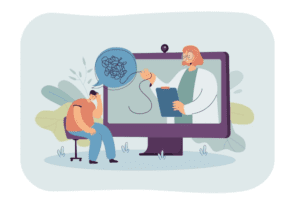Are Freudian Slips Accidents or Unconscious Desires?
This article has been researched and written by Sara Caroppo. AI has not been used in producing this article.
Suddenly, there is silence, eyebrows are raised, and you’re left mumbling, while attempting to explain how that name just magically appeared in your mouth. Yeah, that’s a Freudian slip. And no, you can’t blame autocorrect this time!
Sigmund Freud, the father of psychoanalysis, believed that these little verbal hiccups are more than just accidents. They are windows into our unconscious mind, and those windows can reveal some uncomfortable yet powerful truths.
Most people think a Freudian slip is, in fact, just about saying one thing when you mean your mother, I mean, another. But in therapy, they can go beyond words and sometimes, they take the form of odd sounds, sudden vocalisations, or unexpected bursts of laughter that escape before the brain can apply its usual filter.
Ever had a conversation with someone telling you how upset they were while having a big smile on their face? These mismatches are unconscious slips too, and they reveal more than any carefully curated Instagram caption ever could. One time, a 10-year-old boy I worked with a few years ago insisted he was “super happy” at school but would unconsciously sing the horror movies theme song whenever we talked by his maths teacher. Or another teenage girl who repeatedly said her stepdad was “ok” but would keep scrunching up her nose while saying it, as if her subconscious just couldn’t let that lie slide. But why do these slips matter?

As a child psychologist, I know children and adolescents rarely express their emotions in a clear and concise way. Their unconscious minds do a lot of the talking for them. And sometimes, the most revealing moments aren’t in what they say, but in the pauses, the stutters, the sighs, and even the weird noises that slip out when they think no one is paying attention. In Dubai’s fast-paced, high-achieving environment, where emotions often take a backseat to success, these moments become even more valuable. A young person might insist they are handling school stress “perfectly fine” while repeatedly mispronouncing the word “exam” as “eczema.” A child might loudly say “I love living here”, but unconsciously draw pictures of airplanes heading back to their home country. These aren’t just coincidences; they are tiny leaks from the emotional reservoir.
Now that we have this knowledge, however, it is important that we don’t overanalyse every slip. Sometimes a latte really is just a latte, and not a symbol of your unresolved dairy-related trauma. But if you notice patterns, especially in young people, it is worth exploring what their subconscious might be trying to say. It is also critical that we embrace these moments with curiosity rather than embarrassment. The next time your child insists they love school but simultaneously lets out a noise that sounds like a deflating balloon, maybe dig a little deeper. And if you accidentally call your boss “dad” in a meeting… well, maybe take a day off.
Because whether we are in therapy, cooking, or just trying to survive Hessa Street traffic, our unconscious minds are always speaking. The real question is, are we listening?
10 Steps To Fix A Toxic Relationship
Every relationship has its fair share of ups and downs, but when toxicity creeps in, it can become a serious challenge. Toxic relationships can be emotionally draining and detrimental to our overall …
Exploring the Benefits of EMDR Therapy for Anxiety and Depression
Anxiety and depression are two of the most common mental health disorders worldwide, affecting millions of people every year. While traditional talk therapy and medication can be …
Health Effects of Untreated Depression
It’s very common to feel sadness at one point or another in our life. Depending on your specific circumstances, you may even feel …
Psychologists vs. Psychiatrists – What’s the Difference?
Clients shouldn’t have to jump through hoops to understand who the perfect candidate is for treating their emotional and/or behavioral struggles. Yet, understanding the type of provider you should see during …
Gentle Parenting: What is it and How to Try it Yourself
When it comes to raising children, no one has all the answers. Every parent and child have unique challenges and needs. Navigating these individual circumstances along with ever-changing environments, such as school …
How to Improve Your Relationship with Your Children – A Psychologist’s Guide
The modern family’s lifestyle leaves us shuffling from school to sports practice, family events, visiting friends, and everything in between. As society evolves to become more on-the-go and technologically advanced, w…
Tips for Communicating With Someone Who is Depressed
Knowing what to say to someone who is struggling with depression can be challenging. Perhaps you are afraid you might say the wrong thing. Or maybe you will say something that makes their day even worse? Maybe you fee…
Who Can Benefit From Couple Counseling?
Relationships are far from perfect. Each person brings his or her own ideas, values, opinions, and personal history into a relationship, and they don’t always match their partner’s. Those differences don’t necessaril…
What is EMDR Therapy and How Does it Help People?
Since the days of Freud, we’ve come to expect that managing our trauma is a lifelong journey. However, this is not the case. Eye Movement Desensitization and Reprocessing therapy (EMDR therapy) was developed in 1990 …
Everything You Need to Know About Couples Therapy
It’s perfectly expected for couples in relationships to face challenges from time to time. Every relationship has its unique needs and challenges. Couples see therapy for a number of unique reasons. From miscommunicat…











